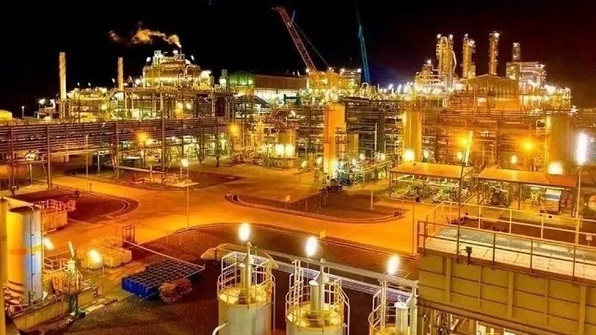Nigeria commissioned the Dangote Refinery on Monday amid hopes of transforming the country into a net exporter of petroleum products, but analysts said securing crude supplies could delay achieving full production this year.
The administration of outgoing President Muhammadu Buhari sees the refinery as the answer to persistent fuel shortages in Nigeria – including most recently in the run-up to February’s disputed presidential election.
Nigeria spent $23.3bn last year on petroleum product imports and consumes around 33 million litres (8.7 million gallons) of petrol daily. The Dangote Refinery has a capacity of 650,000 barrels per day.
The plant plans to export the surplus petrol, turning Africa’s biggest oil producer into an export hub for petroleum products. It also plans to export diesel, according to Aliko Dangote, Africa’s richest man, who funded the refinery’s construction.
The massive petrochemical complex, said to be the world’s largest single-train refinery, cost $19bn to build after being delayed for almost a decade – above initial estimates of between $12bn and $14bn – and has outstanding debt of around $2.75bn, according to Nigeria’s central bank governor.
The complex also has a 435-megawatt power station, a deep seaport and a fertiliser unit.
Speaking at the commission ceremony, Dangote said the priority was to ramp up production to ensure the refinery could fully satisfy Nigerian demand and eliminate “the tragedy of import dependency”.
The ceremony was attended by President Buhari.
Crude supply issues
Dangote expects to begin refining crude in June, but London-based research consultancy Energy Aspects said that commissioning was an intricate process and that it expects operations to start later this year, reaching 50-70 percent next year, with a staggered process of other units into 2025.
The refinery needs a constant supply of crude, but Nigeria’s oil production has been declining due to oil theft, vandalism of pipelines and underinvestment. In April, production fell under one million barrels per day (bpd), below Angola’s output.
Lower production would affect the ability of state-owned oil company Nigerian National Petroleum Corporation (NNPC) to fulfil an agreement to supply Dangote Refinery with 300,000 bpd of crude, said economist Kelvin Emmanuel, who authored a report on oil theft last year.
NNPC, with a 20 percent stake in the refinery, has production-sharing agreements with oil majors like ExxonMobil, Shell and Eni and is entitled to a portion of the crude, which it also swaps with traders for petrol and diesel.
The refinery has not signed an agreement to buy from oil majors in Nigeria.
That could see Dangote importing crude from traders like Trafigura and Vitol, Emmanuel said, at a time when local refining was expected to save foreign exchange and keep prices lower.
Energy Aspects, however, said that in the long run, the Dangote Refinery could end Nigeria’s petrol deficit, reshape the Atlantic basin petrol market and export diesel that meets European Union specifications.





